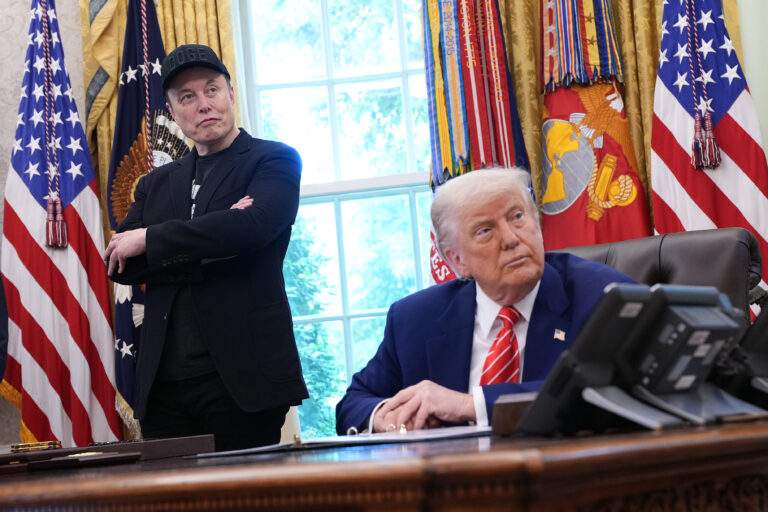Billionaire Elon Musk’s announcement of the America Party following his split with President Donald Trump over the fiscally ruinous One Big Beautiful Bill reveals a fundamental misunderstanding of American political mechanics. While Musk’s frustration with Republican fiscal hypocrisy is entirely justified—the legislation adds over $3 trillion to the national debt while gutting programs working families depend on—his proposed solution ignores both the structural realities governing our electoral system and the unprecedented opportunity currently before him.

Kevin Dietsch/Getty Images
The problem with Musk’s third-party approach lies in what political scientist call Duverger’s Law, which tells us why some countries, like America, only have two political parties. Devastating to Musk’s plans is the fact that this isn’t a matter of voter preference or campaign financing—it’s a mathematical inevitability built into our electoral system’s structure. When electoral districts only have one seat for the taking and it goes to the candidate with a plurality of votes, a stable two-party system is all but guaranteed.
More fundamentally, American political parties are remarkably durable institutions precisely because they serve essential functions within our electoral system. The Democratic and Republican parties have weathered civil wars, depressions, world wars, and countless scandals not through accident but because they provide organizational infrastructure, fundraising networks, and voter identification systems that third parties cannot replicate. Attempting to replace these institutional frameworks represents a decades-long project with vanishingly small chances of success no matter how much money is thrown at it.
Yet Musk’s frustration reflects a real crisis within the Republican Party that creates extraordinary opportunities for internal disruption. The passage of the One Big Beautiful Bill represents a systematic betrayal of the working-class coalition that brought Republicans to power. The legislation strips health care from millions through Medicaid cuts while providing massive tax breaks to the wealthy, forcing working families to fund benefits they’ll never see. This makes traditional Republican incumbents uniquely vulnerable to primary challenges from candidates offering authentic economic populism.
The timing for a hostile takeover of the GOP couldn’t be better. Trump’s constitutional inability to seek another presidential term creates an impending leadership vacuum within the party just as his signature legislation begins harming many of its most loyal voters. Without Trump’s unique personal loyalty among working-class supporters, other Republicans will struggle to maintain a coalition built on contradictions between populist messaging and plutocratic governance.
History demonstrates that successful party transformation occurs through internal disruption, not external competition. The Tea Party movement proved that well-funded primary challenges could reshape party priorities within a single election cycle. Trump himself provided the ultimate template by seizing control of the Republican Party from within, completely remaking it around his vision and priorities.
This approach succeeds because primary elections operate under different dynamics than general elections. Lower turnout means motivated activists can have outsized influence. Incumbent advantages are also weaker there. Moreover, voters willing to participate in primaries are often more ideologically committed than general election voters. A well-funded operation targeting Republican incumbents who supported fiscal irresponsibility could achieve dramatic results with relatively modest investments.
Musk’s business background should make this approach intuitive. The corporate world offers countless examples of activist investors who acquired relatively small stakes in companies and used them to force dramatic changes in strategy and leadership. Republican primaries represent the political equivalent—low-cost, high-impact opportunities to reshape institutional priorities through targeted intervention.
The alternative—attempting to build a third party from scratch—reflects the same kind of political naïveté Musk has displayed throughout his brief involvement in government. His belief that the Department of Government Efficiency (DOGE) could cut a trillion dollars in federal spending demonstrated a fundamental misunderstanding of budget realities, just as his third-party proposal reveals ignorance of electoral mechanics.
Instead of wasting resources on a venture doomed by structural realities, Musk should pursue a strategy that actually works in American politics: identifying vulnerable Republican incumbents who voted for fiscal irresponsibility and funding primary challengers committed to genuine conservatism. This approach offers immediate impact, requires far less capital than third-party construction, and takes advantage of a party that is headed for significant disarray.
Nicholas Creel is an associate professor of business law at Georgia College & State University.
The views expressed in this article are the writer’s own.


